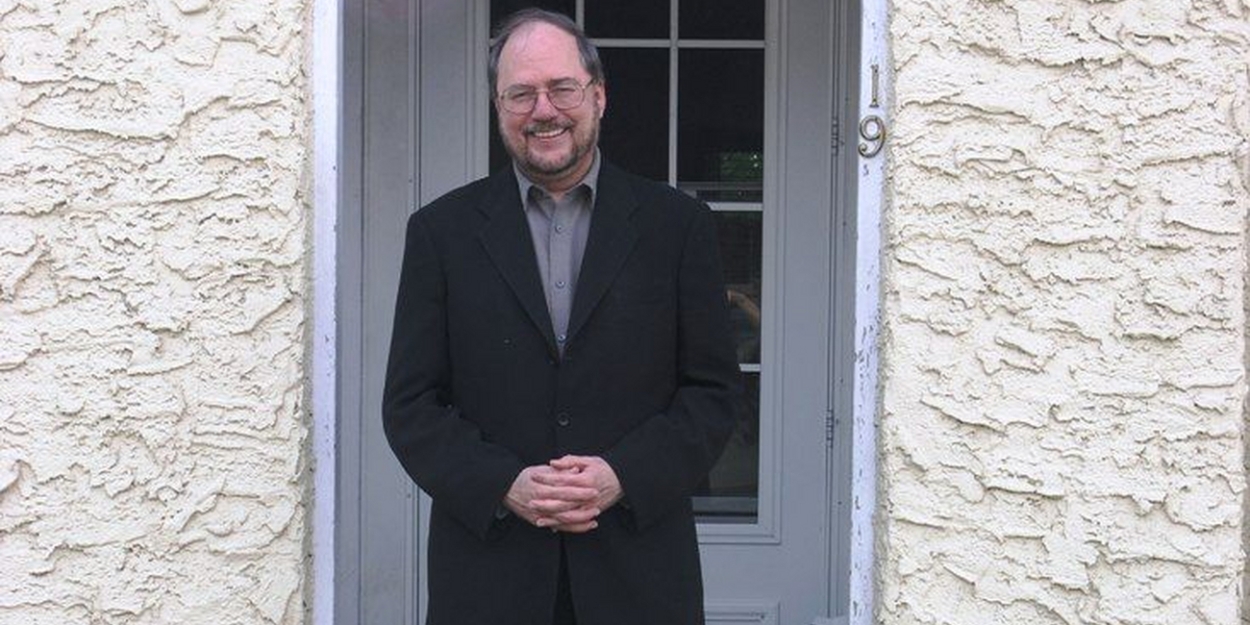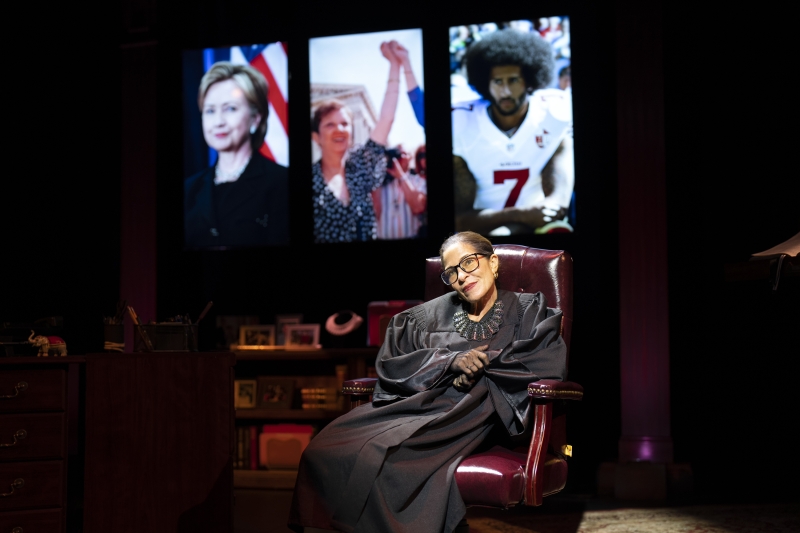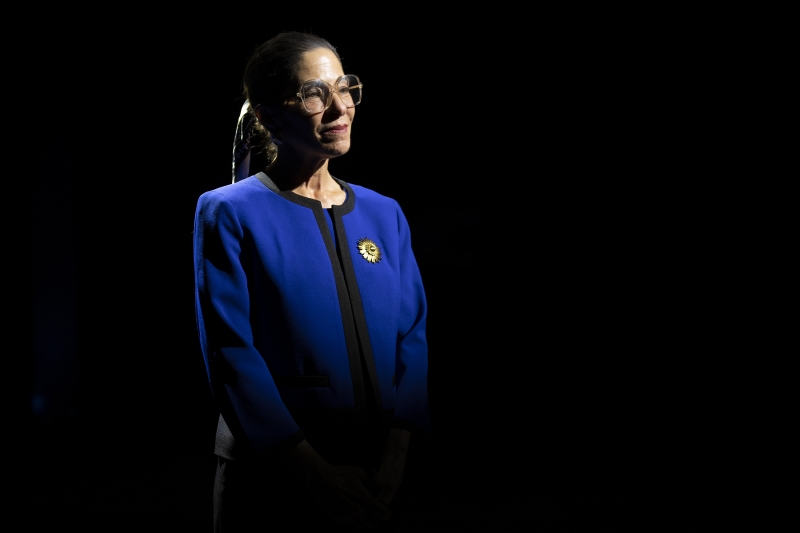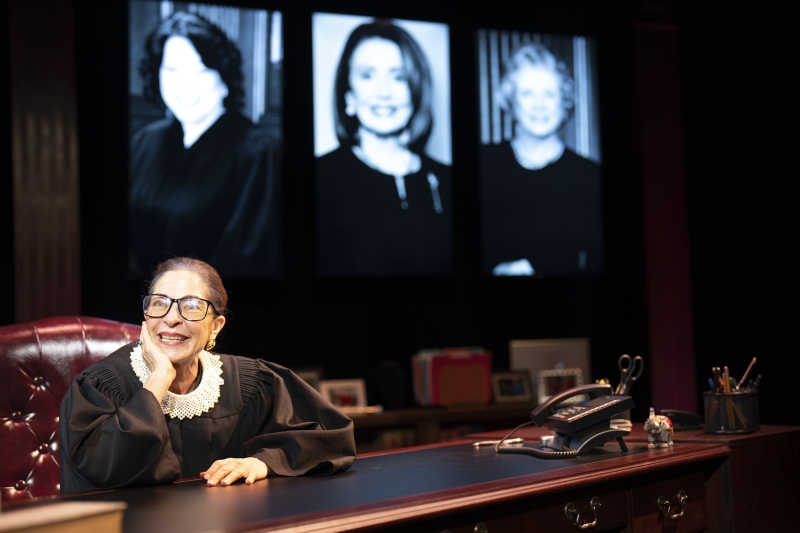Interview: Rupert Holmes Talks the Enduring Legacy of Ruth Bader Ginsburg in ALL THINGS EQUAL
All Things Equal - The Life and Trials of Ruth Bader Ginsburg is currently on a 16 city, 2022-2023 National Tour.

Rupert Holmes is a multiple-Tony Award winning playwright, best known for his musicals The Mystery of Edwin Drood, Curtains, the one-man play Say Goodnight, Gracie, and much, much more. His most recent play, All Things Equal - The Life and Trials of Ruth Bader Ginsburg, is currently on 16 city, 2022-2023 National Tour.
The production is currently running at Bay Street Theatre through November 27th.
Over the course of ninety minutes, this one-woman play presents an intimate portrayal of Supreme Court Justice Ruth Bader Ginsburg, taking us through her childhood, to her time studying law at Harvard while raising a daughter and helping her husband battle cancer, to taking courageous stands for human rights as a member of the Supreme Court.
BroadwayWorld spoke with Holmes about the creation of his play, and Ruth Bader Ginsburg's life and legacy.
What inspired you to write this play? Had you always wanted to write about Ruth Bader Ginsburg, or was there a specific moment that inspired you?
 I had always been interested in her life because she was not only a landmark figure where human rights are concerned, but she accomplished what she did against so many professional and personal challenges. She was battling the odds from high school. She lived an admirable life. I think what inspired me to write the play now was a combination of elements. She had just died, I saw that she was becoming a kind of an icon, and while I thought that was terrific that she was getting the attention and the respect she deserved, I was worried about the Notorious RBG meme, which was funny, but I thought it did her a disservice. I didn't want to see someone who had accomplished so much in such a valiant way become a caricature of say, Granny from The Beverly Hillbillies. She was being portrayed as cantankerous and full of vinegar, but she was actually an incredibly articulate, reasoned, and reasonable human being, who believed that civility can be a component of avid debate.
I had always been interested in her life because she was not only a landmark figure where human rights are concerned, but she accomplished what she did against so many professional and personal challenges. She was battling the odds from high school. She lived an admirable life. I think what inspired me to write the play now was a combination of elements. She had just died, I saw that she was becoming a kind of an icon, and while I thought that was terrific that she was getting the attention and the respect she deserved, I was worried about the Notorious RBG meme, which was funny, but I thought it did her a disservice. I didn't want to see someone who had accomplished so much in such a valiant way become a caricature of say, Granny from The Beverly Hillbillies. She was being portrayed as cantankerous and full of vinegar, but she was actually an incredibly articulate, reasoned, and reasonable human being, who believed that civility can be a component of avid debate.
And also, at that point in time, all theatre had shut down, it was a drought as we've never seen in the history of theater. This was pre-vaccine, and I thought, 'If we are going to have theatre again, we may have to start, as we piece together the gorgeous realm of theatre that we love, with shows for one actor. It might be the only feasible way to rehearse and present a play.' Certainly in the beginning when we all had trepidation about going back inside a theater. And actors were being hit abnormally hard by Covid. So, I thought the life of Ruth Bader Ginsburg was a wonderful launching pad for a one-actor play, because I know from other such works that I've written, that there is a dynamic to a one-actor play that is different, and in some ways just as marvelous as the dynamic of a show which features many actors, or an orchestra.
What was the research process like? She lived such a long and eventful life, how did you decide what ended up in the show?
Certainly I knew I wanted to raise many of the issues for which she was an advocate, or decisions where she was a potent dissenter, but my touchstone was, put it in the context of her life, let people spend time with the human being. Whenever I've done any kind of play about someone's accomplishments, I think the context is just as important as the songs you put in. And in this case, I wanted to always show why it was that she felt the way she felt, what was it in her daily life from high school on that made her take the path she pursued, and how was she able to overcome the things that were obstructions in her personal life, and try to make them be a part of the law of the land so that other women would not have to go through that journey.
And she tended to think in those terms, and I think one of the reasons she tended to think in terms of 'I will pave a way for other women,' is because her mother paved the way for her. And she was keenly aware that her mother was a brilliant woman, a mother who died at the age of 48 and fought cancer much of Ruth's life, and managed to, on a garment workers salary, save $8000 so her daughter could go to college. Because when Ruth Bader Ginsburg's mother graduated from high school at age 15, there was no thought of her going to college, that was going to be a privilege only for the eldest son of the family. I think that she thought of her mother as her champion, and I think that she wanted to be a champion for her daughter, her granddaughters, and for all the women who followed in her footsteps.
Michelle Azar is starring as Ruth Bader Ginsburg, were you in the room for the casting? How involved were you in the casting process?
I was in both the room and the Zoom of the casting of the show, and the director, Laley Lippard, and I both agreed emphatically that this was a role Michelle should play. Seeing her out of makeup and costume, it's not like you say, "Oh, she looks just like Ruth Bader Ginsburg," but there was this spirit and this soulfulness that Michelle broadcast. I was in New York, so I initially saw her through Zoom auditions. But, we went through about 50 different videos of people doing it, and we found some fine candidates, and we have a wonderful understudy, but there is something very special about what Michelle is doing in the role, she is riveting, and stunning, and absolutely credible and authentic in the role.
Lippard, and I both agreed emphatically that this was a role Michelle should play. Seeing her out of makeup and costume, it's not like you say, "Oh, she looks just like Ruth Bader Ginsburg," but there was this spirit and this soulfulness that Michelle broadcast. I was in New York, so I initially saw her through Zoom auditions. But, we went through about 50 different videos of people doing it, and we found some fine candidates, and we have a wonderful understudy, but there is something very special about what Michelle is doing in the role, she is riveting, and stunning, and absolutely credible and authentic in the role.
At most shows that I've seen where she raises a point that someone in the audience might either support or wish to contradict, they reflexively start to talk to her. We had a whole month in St. Petersburg [Florida], and the audience applauded constantly throughout the show, but I know from writing one-person shows, that there is a certain moment where, if the actor and the play are functioning correctly with the audience, even if they intellectually know that's not the person, they begin to think they're with that person. And they begin to cheer their victories, not cheering for the actor doing a good job on a speech, but cheering that person that they have become, for what they've achieved. And that happens with Michelle's performance. It's quite amazing. And if you walked up to anyone in the audience and said, "Do you think that's Ruth Bader Ginsburg?" They'd say, "Of course I know that's an actor doing a wonderful job." But, in the thrall of the play, they suspend all disbelief, and think that they are having a wonderful, private time with a great human being.
How do you feel that this show is currently on a 16-city national tour, and that so many people are going to be able to experience it?
I am just glad that this show can be going out into the world right now, and in this next year, and probably for years to come, because we desperately need to be reminded of what civil discourse was like prior to this new era that we're in. And it wasn't that long ago. We need to be reminded that we don't have to be the way we're evolving, we can take a step back from the abyss and be civil and respectful of each other, and we don't have to be the worst part of ourselves. And I find that this is a reassuring and reaffirming reminder that we can have our differences and we can sort them out, and we can reason them out, and we can do it and still feel clean at the end of the day.
Throughout this whole process, what was the most surprising thing for you to learn about Ruth Bader Ginsburg?
To me, learning things about her as a young woman, and as a college student, were really enlightening to me. And just simple things like that she was a terrific baton twirler! You don't think of Ruth Bader Ginsburg twirling a baton. I knew that I would have a baton in there once I knew that. Also hearing her recount falling in love with her lifetime partner, Martin Ginsburg, her Marty. That was a romance, that was a love, and she loved him because he appreciated her brain, and she loved him because he had a Chevrolet [laughs], and she loved him because they became true partners, loving partners, and he viewed it as a privilege to be able to be along on her journey, and to help facilitate, which he did do. To help facilitate some of her best opportunities, he fought for her behind the scenes. And sometimes she didn't know that he was doing it until after it produced results. So, the love, the music.
She knew no limits to her expectations, so when she fell in love with Martin, and he went to Harvard, she thought, "Ok, well, I'll finish out this year at Cornell, and then I'll go to Harvard too." It never occurred to her that that might be a problem. And the fact that out of 500 law students at Harvard, the number of women was 9. And she thought, "Well, I'll be one of those." And then she became that. The dean of Harvard Law School thought that she met her husband at Harvard and married him at Harvard. What he didn't know was not only was she married to him before she went to Harvard, but she had a three year-old daughter, and was taking care of her husband who had cancer as a young man. So while she is at Harvard doing this impossible thing for any woman in the world, 9 out of 500, she is not only there to be with her husband and get the best law education she can get, but she is having to raise a child, take care of her husband who is in chemotherapy, and educate her husband because he cant attend classes, so she has to get the notes from other students and be his personal professor at her first year at Harvard.
Just learning these things about her, her love of opera, particularly Puccini, resonated with me, and I knew that the music of opera would be interwoven into the piece. So I got to assemble a kind of a score out of some of the music that she most loved, and probably some of the recordings that she had in her record collection in the 1950s and 60s.
What do you hope that people take away from this show?
 I would hope that coupled with the remarkable achievements and battles she waged in her career, they would come away with the understanding that this was all done by a human being, a human being who for a considerable portion of her life was fighting all sorts illness, and receiving all sorts of treatments, and never knuckled under. One of the beauties of writing a one-actor play, is that the audience gets to play a role themselves. If an actor just came out and recited their story, the audience doesn't have to be there. A one-actor play needs to be with the audience. You have an audience with the pope, you have an audience with the king, you have an audience with the actor, with the character. And I would hope that they would feel, and it's certainly designed to accomplish this, that they have had a rare opportunity to sit with a magnificent human being, and talk with them as one human being to another. That they've had the unique opportunity to sit across the table with someone whose life is really worth learning about.
I would hope that coupled with the remarkable achievements and battles she waged in her career, they would come away with the understanding that this was all done by a human being, a human being who for a considerable portion of her life was fighting all sorts illness, and receiving all sorts of treatments, and never knuckled under. One of the beauties of writing a one-actor play, is that the audience gets to play a role themselves. If an actor just came out and recited their story, the audience doesn't have to be there. A one-actor play needs to be with the audience. You have an audience with the pope, you have an audience with the king, you have an audience with the actor, with the character. And I would hope that they would feel, and it's certainly designed to accomplish this, that they have had a rare opportunity to sit with a magnificent human being, and talk with them as one human being to another. That they've had the unique opportunity to sit across the table with someone whose life is really worth learning about.
2022-2023 National Tour Schedule
Date Venue City, State
2022
Oct. 5 - 30 Free Fall Theatre St. Petersburg, FL
Nov. 03 - 27 Bay Street Theatre Sag Harbor, NY
2023
Feb. 15 - 19 Delray Beach Playhouse Delray Beach, FL
March 1 Lincoln Theatre Washington, DC
March 2 Millersville University (The ware Center) Lancaster, PA
March 3 The Ridgefield Playhouse Ridgefield, CT
March 5 Sugar Loaf Performing Arts Center Chester, NY
March 11 The Madison Center for the Arts Phoenix, AZ
March 14 The Michigan Theater Ann Arbor, MI
March 20 The Valentine Theatre Toledo, OH
March 21 Stocker Arts Center Elyria, OH
March 22 EJ Thomas Hall Akron, OH
March 24 Woodruff Arts Center Atlanta, GA
April 20 Bloomington Center for the Performing Arts Bloomington, IL
May 2 Attucks Theatre or Nofolk Academy Norfolk, VA
May 6 The Reg Lenna Center for the Arts Jamestown, NY
Photo credit: Thee Photo Ninja
Videos

